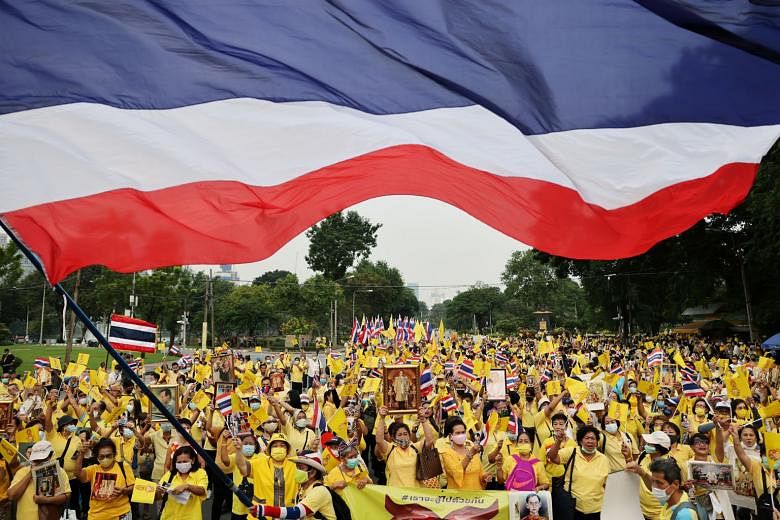BANGKOK • More than 1,000 yellow-shirt Thai royalists demonstrated in support of King Maha Vajiralongkorn yesterday, close to where thousands of people had marched a day earlier to demand reforms of the monarchy.
Youth and student-led protests began in Thailand in July to call for the resignation of Prime Minister Prayut Chan-o-cha - a former army ruler - and a new Constitution, but have increasingly sought curbs on the monarchy's powers.
"We want to show support and encouragement to His Majesty," said Mr Thatchapan Boriphet, 57, at Lumphini Park in central Bangkok. "I am neutral politically but I cannot stand it when there is a violation of the monarchy."
So far, royalist demonstrations have been considerably smaller than the tens of thousands of people who have joined the biggest protests against the government.
Protesters have accused the King of political involvement and marched to the German Embassy on Monday to seek an inquiry into whether he exercised his powers during long stays in Germany, something Berlin has said would be unacceptable.
The palace has a policy of not commenting to the media and has made no comment since the start of the protests. The King is in Thailand.
Royalists took heart at the weekend when the King lauded as "very brave" a man who had defied protesters by holding up a picture of the late King Bhumibol Adulyadej, but the reaction of protesters has been scathing.
Mr Prayut has ignored demands to quit and said the crisis should be discussed in Parliament, where his supporters are in the majority, during an emergency session on Monday and yesterday.
In Parliament, Thai lawmakers are weighing a proposal to set up a committee to explore ways to end the protests.
A working group is looking at a panel proposed by Deputy Premier Jurin Laksanawisit, House Speaker Chuan Leekpai said yesterday, with Parliament set to wrap up the special two-day session.
Pro-democracy groups vowed to stage more rallies if they did not like the result from Parliament.
"We're assessing the situation daily to plan our next move," said Mr Jatupat Boonpattararaksa, a protest leader. "We submitted a letter to the German Embassy, so we're still waiting for a response, and we still have to listen to what the Parliament has to say today."
The protesters want Mr Prayut to resign, changes to a Constitution written after a 2014 coup and greater accountability and transparency for the monarchy - the most powerful institution in the country.
"The session was just a move to show that the government is working on finding solutions, but in fact they haven't really considered the input from the protesters and the public," said Dr Virot Ali, a lecturer at Thammasat University's Faculty of Political Science.
"A committee that would be set up likely won't result in anything. It won't de-escalate the protest movement."
Mr Prayut has struggled to quell the protest movement, forcing him to withdraw a state of emergency in the capital within a week of its imposition and asking protesters to "take a step back" to de-escalate the situation.
On Monday, Mr Prayut told Parliament that it can take up the charter amendment process next month and conclude discussions in December.
Opposition parties have told him that he should step down for the good of the country and stop using his proclaimed support for the monarchy as an argument to keep power.
His opponents say he kept power in last year's election only thanks to electoral rules and a Constitution drawn up by the junta he headed after the 2014 coup. He says that the ballot was fair.
The suggestions of past reconciliation committees in Thailand have largely gone ignored, including recommendations issued after a bloody crackdown on pro-democracy protesters in 2010.
REUTERS, BLOOMBERG

